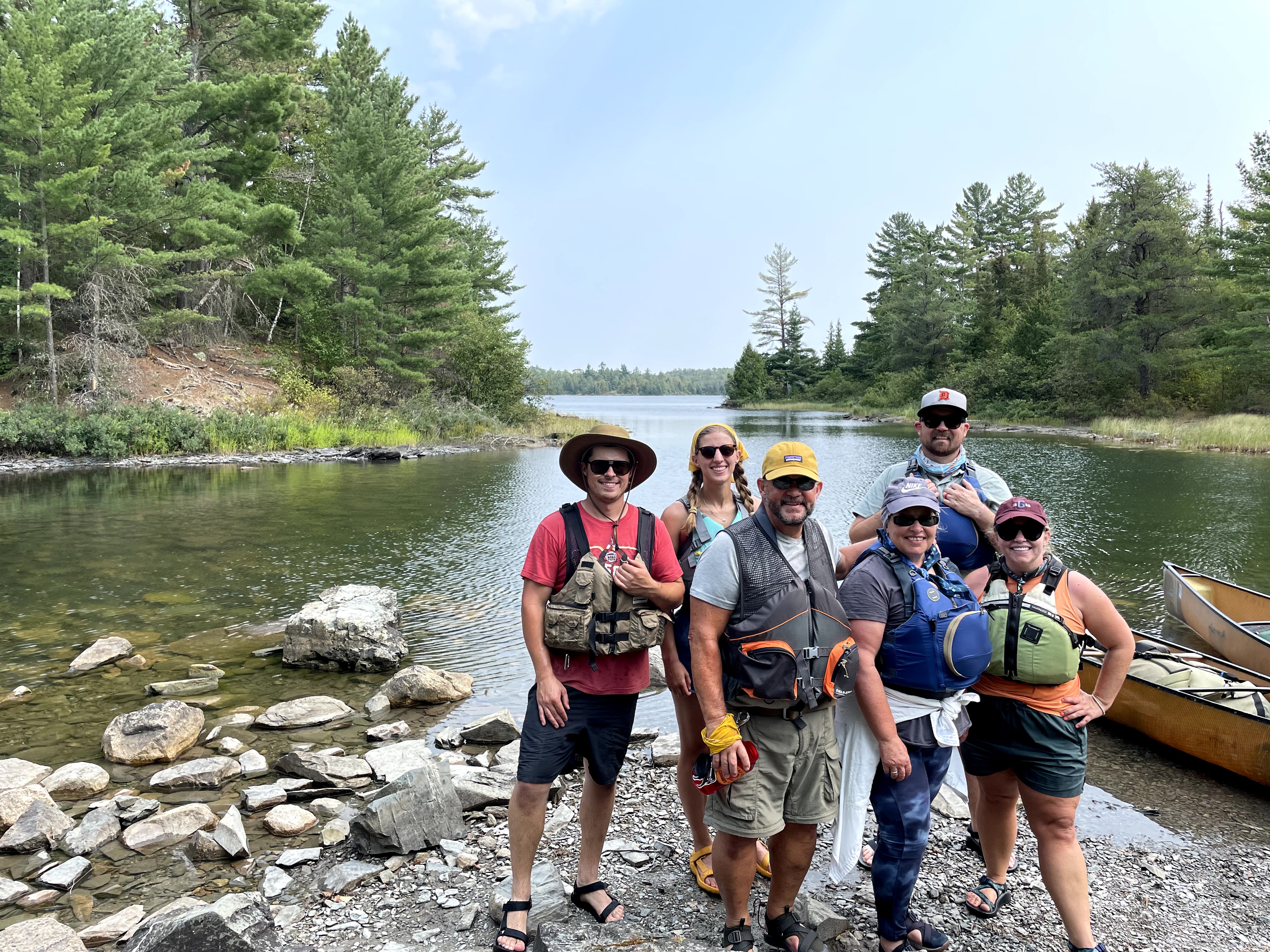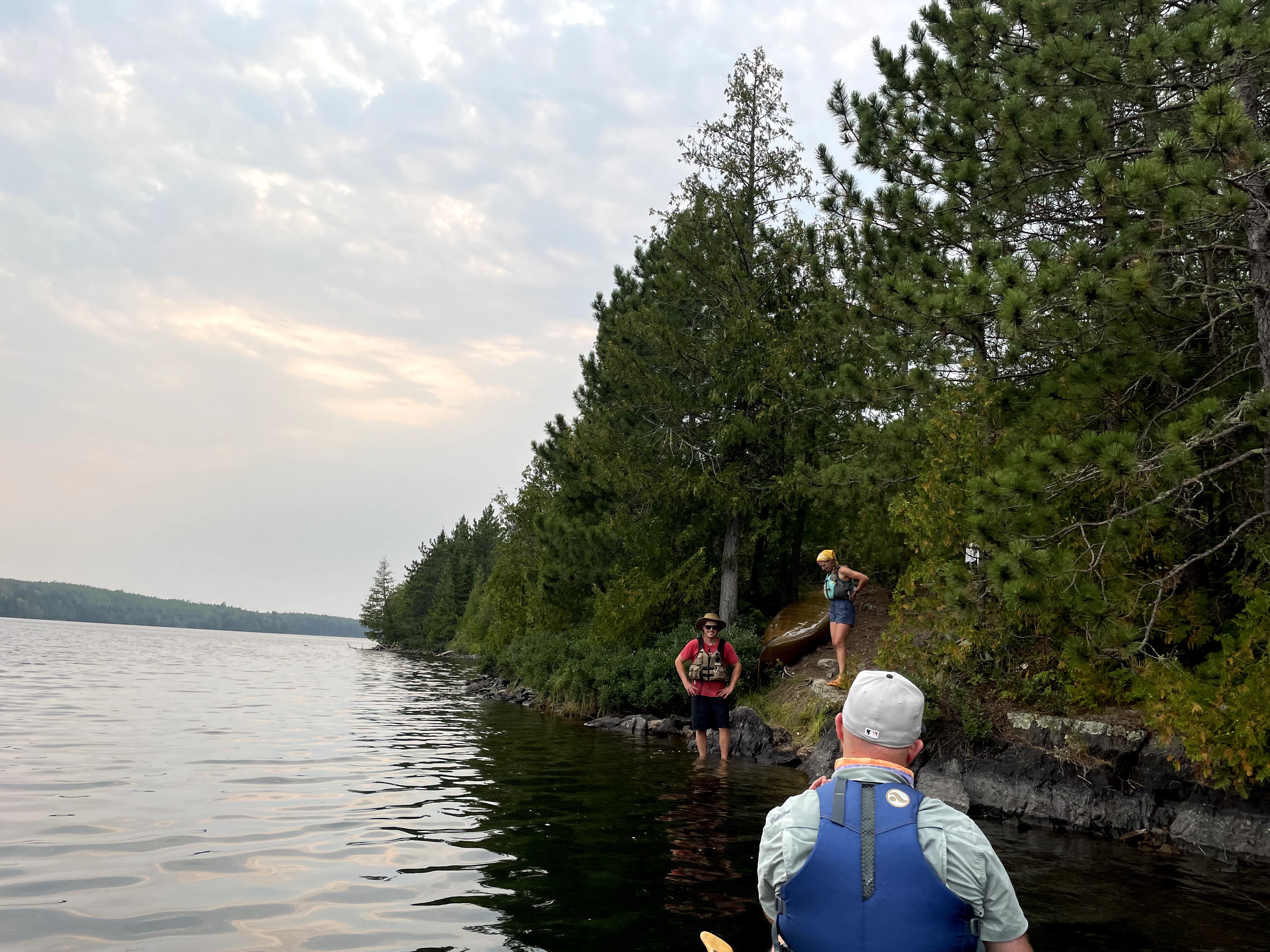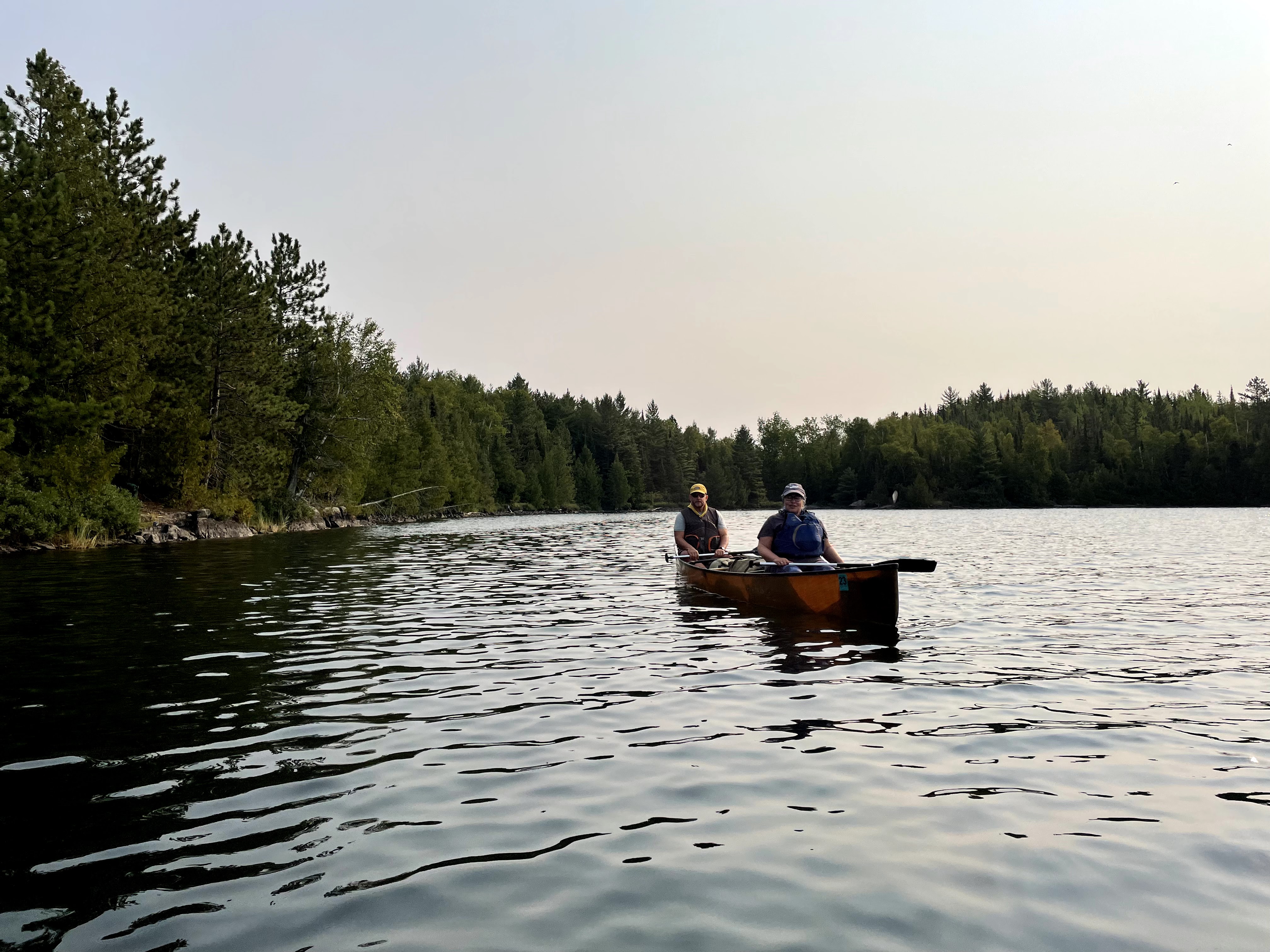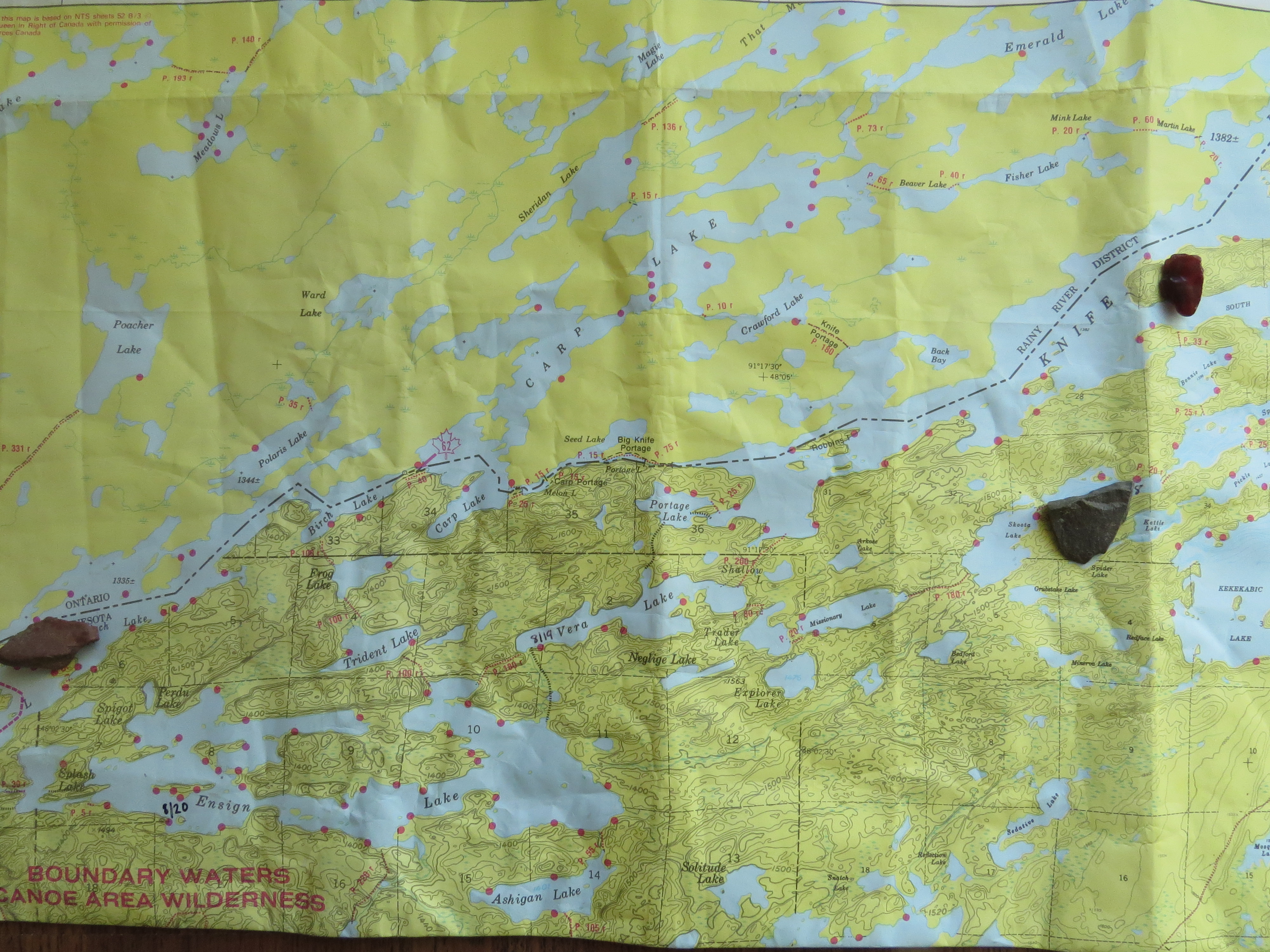What keeps us from the restorative bliss of sleep? Who are the gatekeepers that decide whether we have restful sleep or fitful stirrings and wide-eyed starings into the dark? My first night in the Boundary Waters was the later. I was tired enough, and no caffeine gatekeeper propped my eyes open. It was not the fear gatekeeper, as I was on solid ground, and I was not afraid of any potential bears bumbling into our campsite. (I have an intimate past with the fear gatekeeper who has kept me awake far too many nights of my life.) Pain is a common gatekeeper—physical pain or emotional pain, it makes no difference—there is no restful sleep for the pained, a relief though it is. I think I was under the influence of the busy-mind gatekeeper—I had so much to think about and process from the unusual, out-of-my-comfort-zone day. Drinking too much water towards the end of the day didn’t help any. Zzzzipping out of the tent and zzzzipping back in seemed to make enough noise to wake all the critters of the forest. It was also too warm, too muggy, and too smokey, so I guess the discomfort gatekeeper was standing guard. The fitful sleep and star-staring was the background to the most difficult day of our trip…and to my most important one.
When I opened my eyes and saw the red ball of sun rising over the water, I zzzzipped out of bed and found Chris already throwing in a line. It’s good his day started peaceful.


We had a ‘big’ breakfast—hashbrowns, scrambled eggs (thanks to Egg Beaters) with bacon bits, and hot tea and coffee. Water for coffee, cooking, or washing dishes is dipped from the lake and boiled for a couple minutes.

After breakfast, we cleaned up, packed up, and got ready to travel into Knife Lake. We talked about portaging, as we had five portages to get from Birch Lake to Knife Lake. Portages are the ‘hiking’ portion of a BWCA trip, how we get from one lake to another or around a rocky rapids area of a river that connects two lakes. Ideally, you do it all in one trip with everyone carrying something. Something meaning packs, canoes, paddles, and fishing poles. I was excited for my first portages!

But first, a breakdown…and I don’t mean an analysis of the game of portaging. I mean me, once I was in the canoe again…trying to paddle. It’s like my arms weren’t working right. I felt weak. The kids were already a ways ahead of us. I would put the paddle down, hang my head down, and try to talk myself back to it. It wasn’t working very well—my paddle and head were down for longer than I was moving forward. I started to cry. I was so frustrated with myself. Unfortunately for Chris, I took a bunch of that frustration out on him. As the ‘back’ person in the canoe, he was responsible for steering us, and I was the forward motion ‘power.’ Since I wasn’t bringing the ‘power,’ it felt like we weren’t going anywhere—and if we were, it felt like the wrong direction. I was chippy with him, asking those no-answer questions like, “Why are we going in that direction?” and “Where are you going?” He probably didn’t hear half of them. I don’t remember how long before the kids stopped and waited for us. I felt, once again, like I couldn’t do this. Emily was a little exasperated with me, ” Mom, you can’t keep doing this!” More tears, more frustration with myself. Finally, Aaron told us when campers were having a hard time, everybody would just take a break. Put the paddles down. Sit still. Breathe. So we did that. I don’t know how long…but it worked. I was able to paddle again.
We glided through the long, narrow, beautiful Birch Lake until we got to our first portage—a 40 rod portage. (One rod is equal to 16.5 feet, which is the length of an average canoe.) I heard him before I saw him. He greeted us with some chattering calls. I quickly pulled my camera from my life jacket pocket, thinking he would fly away. But he didn’t. He was the portage gatekeeper. He watched us disembark from the canoes, get the packs and canoes hoisted onto our shoulders, and walk into the woods! I heard him make the same calls when a canoe behind us came to the portage!


On the other side of the portage, we stopped to celebrate our first one! I now knew I could carry a personal pack, which Aaron estimated to be between thirty-five and forty pounds. But it was the kids who really impressed me—how they easily carried a pack and a canoe!

We had portaged around a rocky creek, and I didn’t realize until looking at the map just now that the creek belonged to Canada. We were walking the line and canoeing the line between two countries.



We lunched in Carp Lake. We portaged into Melon Lake, a small, shallow lake with the clearest water—it was like a natural swimming pool. We portaged again and again up the Knife River. Our portages were smooth—everyone knew what they were carrying and who was helping who with lifting packs or clipping water bottles. After our longest portage of the day, 92 rods, we opened up into Knife Lake. The water was ‘bigger’ than we had traveled all day, more open, windier, and wavier. Our first priority was to find a campsite.





Every campsite, marked with a red dot on the maps, was occupied. What was strange is we had only seen two groups traveling all day. We felt like the lone canoers on Knife. We paddled on. The air got smokier, and the sun got hotter. It was somewhere on Knife Lake where I had a reckoning with the water and waves. The kids were scouting each campsite, so often they were headed in different directions, and Chris and I tried to just move towards them or between them. We didn’t really know where we were going—we were just going and knowing they were not waving us in to a campsite. In the reckoning, I gave in to the waves. In the reckoning, I rode on the deep waters. I was paddling strong and steady, and at times, it felt like we were skimming from wave top to wave top as light as a feather. While some of the others were voicing their discouragement, I finally felt like I could do this!

We passed about fifteen campsites before we changed course to portage into some smaller lakes to see if the few campsites on them were open. It also turned the loop on our traveling so we were heading back towards our entry/exit point instead of going farther north and east. The campsites on the first two lakes we portaged into were taken. As the sun got lower in the sky, Aaron was formulating his plan of what to do if no campsites were available by dark (we found out later.) We portaged out of Spoon Lake through a mucky, swampy, muddy portage. The muck was so deep we couldn’t get out of the canoes, but the water was so shallow and littered with logs that we got hung up. Aaron helped ‘lift’ our canoe over the logs from his canoe and by balancing on the slippery logs until we got to solid ground. As we began our eighth portage of the day, we hoped and prayed the next lake would offer us a campsite. We didn’t paddle long before Aaron scoped out a place that barely even looked like a campsite—but it was, and it was unoccupied! We had made it!


We unloaded, pulled the canoes out of the water, and got down to the business of filtering water and preparing supper. We had pizza! The pre-baked pizza crusts had been quartered in order to fit in the bear barrels. We topped each with pizza sauce, green peppers, onion, pepperoni, and cheese and ‘baked’ them in a frying pan over the backpacking stove. They tasted so good! We cleaned up quickly, set our tents up in the very small, bumpy area around the fire grate, stuck the bear barrels under the canoes for this one night, and soon the mosquitoes chased us into our tents. What a big, big day!


A reckoning is an appraisal or judgement of a situation. It is often used in a financial way of settling accounts. In a spiritual way, it is wrestling with our inner thoughts and emotions about any given thing, usually when our backs are up against the wall or in my case, when in the middle of a lake in a canoe for hours with no campsite in sight. Not only did I have to reckon with my feelings of fear about the deep water and the waves, I also had to reckon with my feelings of inadequacy. That part actually played out over the five days, but I made a huge step forward in my self-confidence. Later, after we were off trail, Emily asked me why I thought I needed to keep up with the ones who were so much younger and more experienced. Hmmm, that’s a good question.
Our quiet timekeeper (who had a watch) told us we had been on the water for eight hours that day. I had no concept it had been that long. We traveled through eight lakes, big and small, and had hiked eight portages. That was the accounting, the summing up, the reckoning of our day #2 in logistic terms.

The reckoning inside myself probably wouldn’t have happened without the challenge of all those eights, and for that reason, I am grateful for the day. I wondered how my sleep deprivation had played into it all—had it opened me up to the reckoning? I know I’m not proud of my snipping at Chris all day long or of how raw and vulnerable I felt in the morning, but it led me to a triumph I didn’t think possible. So respect to the gatekeepers, whoever they are.
This is the second post in a series of five that chronicles my experience of five days in the Boundary Waters Canoe Area (BWCA). It is best to read the whole series from the beginning (Anticipation) in order to understand certain things I refer to in my other posts.
Thanks for sharing, Denise! I’m so happy to hear about your experiences in the BWCA, even the challenging ones. I’m so proud of you!
Thank you, Anne! I had such good teachers, as you know!
Aaron and Emily both spoke some words of wisdom along the way. You and Chris raised thoughtful adults.